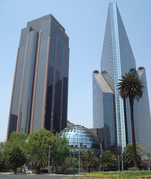Portal:Latin America
  Latin America is a collective region of the Americas where Romance languages—languages derived from Latin—are predominantly spoken. The term was coined in France in the mid-19th century to refer to regions in the Americas that were ruled by the Spanish, Portuguese, and French empires. The term does not have a precise definition, but it is "commonly used to describe South America, Central America, Mexico, and the islands of the Caribbean". In a narrow sense, it refers to Spanish America and Brazil (Portuguese America). The term "Latin America" is broader than Hispanic America, which specifically refers to Spanish-speaking countries, and categories such as Ibero-America, a term that refers to both Spanish and Portuguese-speaking countries from the Americas, and sometimes from Europe. The term Latin America was first used in Paris at a conference in 1856 called "Initiative of America: Idea for a Federal Congress of the Republics" (Iniciativa de la América. Idea de un Congreso Federal de las Repúblicas), by the Chilean politician Francisco Bilbao. The term was further popularized by French emperor Napoleon III's government of political strongman that in the 1860s as Amérique latine to justify France's military involvement in the Second Mexican Empire and to include French-speaking territories in the Americas, such as French Canada, Haiti, French Louisiana, French Guiana, Martinique, Guadeloupe and the French Antillean Creole Caribbean islands Saint Lucia, and Dominica, in the larger group of countries where Spanish and Portuguese languages prevailed. The region covers an area that stretches from Mexico to Tierra del Fuego and includes much of the Caribbean. It has an area of approximately 19,197,000 km2 (7,412,000 sq mi), almost 13% of the Earth's land surface area. In 2019, Latin America had a combined nominal GDP of US$5,188,250 trillion and a GDP PPP of US$10,284,588 trillion. (Full article...) Entries here consist of Good and Featured articles, which meet a core set of high editorial standards.
The Venezuelan crisis of 1902–1903 was a naval blockade imposed against Venezuela by Great Britain, Germany, and Italy from December 1902 to February 1903, after President Cipriano Castro refused to pay foreign debts and damages suffered by European citizens in recent Venezuelan civil wars. Castro assumed that the American Monroe Doctrine would see Washington intervene to prevent European military intervention. However, at the time, United States president Theodore Roosevelt and his Department of State saw the doctrine as applying only to European seizure of territory, rather than intervention per se. With prior promises that no such seizure would occur, the U.S. was officially neutral and allowed the action to go ahead without objection. The blockade saw Venezuela's small navy quickly disabled, but Castro refused to give in, and instead agreed in principle to submit some of the claims to international arbitration, which he had previously rejected. Germany initially objected to this, arguing that some claims should be accepted by Venezuela without arbitration. President Roosevelt years later claimed he forced the Germans to back down by sending his own larger fleet under and threatening war if the Germans landed. However he made no preparations for war against a major power, nor did he alert officials at the State Department, War Department, Navy Department or the Senate. (Full article...)
Buenos Aires (/ˌbweɪnəs ˈɛəriːz/ or /-ˈaɪrɪs/; Spanish pronunciation: [ˈbwenos ˈajɾes] ), officially the Autonomous City of Buenos Aires, is the capital and primate city of Argentina. The city is located on the western shore of the Río de la Plata, on South America's southeastern coast. "Buenos aires" is Spanish for "fair winds" or "good airs". Buenos Aires is classified as an Alpha global city, according to the Globalization and World Cities Research Network (GaWC) 2020 ranking. The city of Buenos Aires is neither part of Buenos Aires Province nor the Province's capital; rather, it is an autonomous district. In 1880, after decades of political infighting, Buenos Aires was federalized and removed from Buenos Aires Province. The city limits were enlarged to include the towns of Belgrano and Flores; both are now neighborhoods of the city. The 1994 constitutional amendment granted the city autonomy, hence its formal name of Autonomous City of Buenos Aires. Its citizens first elected a Chief of Government in 1996; previously, the Mayor was directly appointed by the President of Argentina. (Full article...)
The following are images from various Latin America-related articles on Wikipedia.
The Tatacoa Desert, the second largest arid zone in Colombia after the Guajira Peninsula, is one of the most attractive scenery Colombia and occupies 330 square kilometers of land in ocher and gray brushstrokes of green cactus.. The mola or molas, forms part of the traditional outfit of a Kuna woman, two mola panels being incorporated as front and back panels in a blouse. The full costume traditionally includes a patterned wrapped skirt (saburet), a red and yellow headscarf (musue), arm and leg beads (wini), a gold nose ring (olasu) and earrings in addition to the mola blouse (dulemor).
In Dulegaya, the Kuna's native language, "mola" means "shirt" or "clothing". The mola originated with the tradition of Kuna women painting their bodies with geometrical designs, using available natural colors; in later years these same designs were woven in cotton, and later still, sewn using cloth bought from the European settlers of Panama.
Territories (in bold), dependencies, and subnational entities of a country not located primarily in Latin America are italicized.
North and Central America Caribbean South America |

































